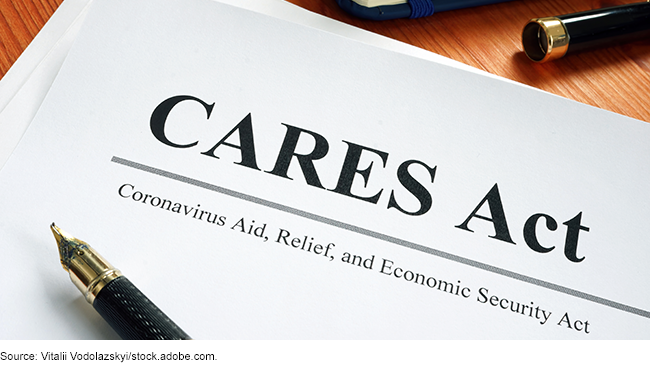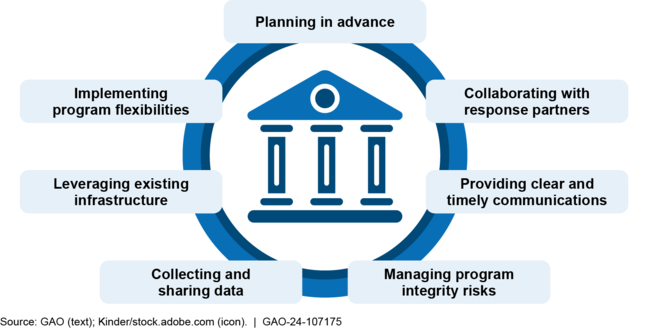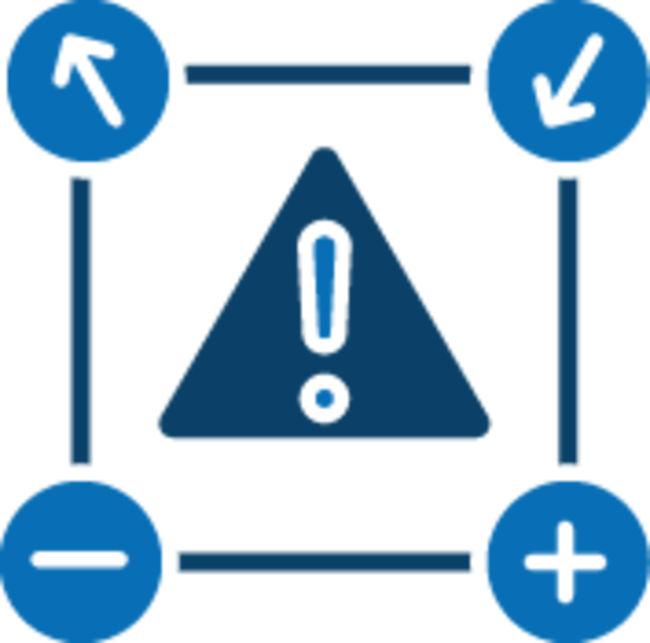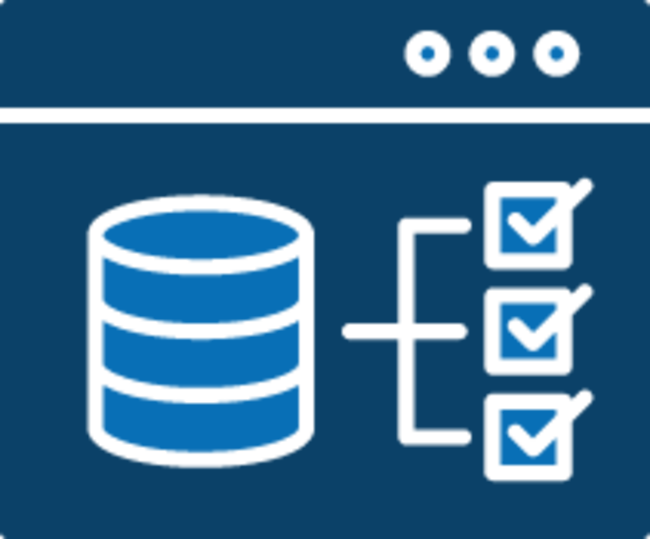COVID-19: Lessons Can Help Agencies Better Prepare for Future Emergencies
Fast Facts
We've issued 11 comprehensive reports and numerous other reports on the COVID-19 pandemic. Our review of these reports identified lessons learned that could help federal agencies better prepare for, respond to, and recover from future emergencies.
Implementing the recommendations in these reports can also improve preparedness. As of April 2024, we've made 428 recommendations to federal agencies and raised 24 matters for congressional consideration. Of the recommendations, 220 remain open.
In this 12th comprehensive COVID-19 report, we made one new recommendation to the Department of the Treasury to help it prepare for future financial disasters.

Highlights
What GAO Found
The nation continues to recover from the public health and economic effects of the COVID-19 pandemic. For example, COVID-19 was the tenth leading cause of death in 2023, as compared to being the third leading cause of death in 2020 and 2021. Available data also show that inflation declined between March 2023 and March 2024, but remained higher than pre-pandemic levels.
GAO identified lessons from the COVID-19 pandemic that could help federal agencies better prepare for, respond to, and recover from future emergencies. These lessons draw on GAO's COVID-19 oversight work, which includes 428 recommendations to federal agencies and 24 matters for congressional consideration as of April 2024. Of these recommendations, 220 remain open. Moreover, these recommendations include those related to the three areas GAO added to its High Risk List during the COVID-19 public health emergency:
- the Department of Health and Human Services' leadership and coordination of public health emergencies,
- the Department of Labor's Unemployment Insurance system, and
- the Small Business Administration's emergency loans to small businesses.
Agencies across the government could improve their preparedness for future emergencies by fully implementing GAO's recommendations.
Lessons that could help federal agencies better prepare for future emergencies fall into seven topic areas. These lessons highlight instances where government agencies did well in responding to the pandemic, as well as instances where the government response could have been much better.
Lessons Learned for Federal Agencies from the COVID-19 Pandemic

|
|
PLANNING IN ADVANCE Advanced plans—including national-level strategies and department- and agency-level plans—provide vision for how the federal government will respond to public health emergencies and are critical to the nation's preparedness and ability to implement a timely response. Agencies can further enhance their preparedness by
GAO found instances where federal agencies could improve their preparedness by taking such steps. For example, the Department of the Treasury has not incorporated lessons GAO identified from the COVID-19 assistance programs to the aviation industry into its efforts to compile resources to prepare for future financial disasters. Taking such steps could help Treasury make timely decisions and avoid encountering past challenges when responding to future emergencies. Further, GAO has made recommendations to federal agencies to improve their emergency response plans. For example, GAO recommended that the Department of Health and Human Services develop plans outlining steps to mitigate shortages in needed medical supplies, develop a comprehensive testing strategy, and develop an approach for assessing and addressing known challenges and future risks associated with advanced development and manufacturing of medical countermeasures, including vaccines. |
Source: GAO (text); Kinder/stock.adobe.com (icons). | GAO-24-107175
|
|
COLLABORATING WITH RESPONSE PARTNERS Collaborating with response partners—including federal and nonfederal partners—before and during public health emergencies can help agencies efficiently implement response activities and continue operations. Federal agencies can facilitate this collaboration by identifying partners key to implementing the response, regularly coordinating with identified partners, and ensuring partners understand their roles and responsibilities in implementing the response. GAO has made recommendations to agencies across the federal government to improve their collaboration with response partners. For example, GAO recommended that the Department of Health and Human Services share its plans to mitigate medical supply shortages with response partners and maintain up-to-date guidance for partners on requesting and receiving assets from the Strategic National Stockpile. |
Source: GAO (text); Kinder/stock.adobe.com (icons). | GAO-24-107175
|
|
PROVIDING CLEAR AND TIMELY COMMUNICATIONS Federal agencies can enhance their efforts to effectively administer relief funds, vaccines, and other critical resources during a public health emergency by providing clear and timely information to
GAO has made recommendations to federal agencies to improve their communications during public health emergencies. For example, GAO recommended that the Small Business Administration develop a comprehensive strategy for communicating with potential and actual program applicants in the event of an emergency. GAO stated that its strategy should include guidelines for the types of information and timing of information to be provided to program participants throughout an emergency. |
Source: GAO (text); Kinder/stock.adobe.com (icons). | GAO-24-107175
|
|
MANAGING PROGRAM INTEGRITY RISKS Establishing controls and processes can help federal agencies manage program integrity risks when they must disburse emergency relief funds quickly during an emergency. Specifically, prepayment controls and processes can help agencies minimize the likelihood of improper payments and fraud. Further, postpayment controls and processes can help agencies identify and recover improper and fraudulent payments when the quick disbursement of funds makes prepayment controls difficult to apply fully. GAO has made recommendations to federal agencies to better manage program integrity risks in emergency assistance programs. For example, GAO recommended that the Department of Labor design and implement an antifraud strategy for unemployment insurance programs that is consistent with leading practices outlined in GAO's Fraud Risk Framework. |
Source: GAO (text); Kinder/stock.adobe.com (icons). | GAO-24-107175
|
|
COLLECTING AND SHARING DATA Collecting and sharing data can help federal agencies
GAO has made recommendations to federal agencies to enhance their ability to collect and share data before and during public health emergencies. For example, GAO recommended that the Department of Health and Human Services develop a plan to establish an electronic nationwide public health situational awareness network and identify measurable steps for completing this network. |
Source: GAO (text); Kinder/stock.adobe.com (icons). | GAO-24-107175
|
|
LEVERAGING EXISTING INFRASTRUCTURE Leveraging the existing infrastructure—including programs, partnerships, and systems—can help federal agencies implement timely activities to respond to a public health emergency and efficiently manage them. Specifically, federal agencies can use existing infrastructure to facilitate the delivery of services, distribute federal relief funds, and manage and oversee response programs. GAO identified instances during the COVID-19 pandemic where federal agencies successfully leveraged the existing infrastructure. For example, the Department of the Interior and the Indian Health Service leveraged existing program mechanisms to efficiently distribute COVID-19 relief funds to tribal recipients during the pandemic. GAO has made recommendations to federal agencies to seek such opportunities. Further, GAO suggested that Congress consider enacting automatic increases in federal Medicaid spending during economic downturns to increase federal Medicaid support in a more timely and targeted fashion. |
Source: GAO (text); Kinder/stock.adobe.com (icons). | GAO-24-107175
|
|
IMPLEMENTING PROGRAM FLEXIBILITIES Implementing flexibilities—such as telehealth and telework—during a public health emergency can help federal agencies
GAO has recommended that federal agencies examine the extent to which flexibilities utilized during the COVID-19 pandemic could be incorporated in standard operations or used during future emergencies. For example, GAO recommended that the Food and Drug Administration fully assess whether and how alternative tools could help meet drug oversight objectives when in-person inspections are not possible in the future. |
Source: GAO (text); Kinder/stock.adobe.com (icons). | GAO-24-107175
Why GAO Did This Study
The COVID-19 pandemic brought significant challenges to the nation's public health and economy. Since March 2020, Congress has provided about $4.65 trillion in federal funds to help the nation respond to and recover from the pandemic. Agencies across the government have worked to implement the federal response.
The CARES Act includes a provision for GAO to report regularly on the public health and economic effects of the pandemic and the federal response. This report includes updates on the public health effects and economic conditions since the pandemic, including updates on federal COVID-19 relief funding. It also describes lessons learned from the pandemic that could help federal agencies better prepare for future emergencies.
To describe lessons learned for federal agencies, GAO analyzed issued GAO reports. GAO also collected information on agency actions to address GAO COVID-19 recommendations.
Recommendations
GAO is making one new recommendation to the Department of the Treasury to include key lessons from the COVID-19 emergency financial assistance provided to the aviation industry in its efforts to compile resources to prepare for future financial disasters. A Treasury official told us that Treasury agrees with our recommendation and will take steps to implement it.
Recommendations for Executive Action
| Agency Affected | Recommendation | Status |
|---|---|---|
| Department of the Treasury | The Secretary of the Treasury should include key lessons from the COVID-19 emergency financial assistance provided to the aviation industry, including those lessons identified by GAO and other auditing entities, in the department's ongoing efforts to compile resources to prepare for future financial disasters. (Recommendation 1) |
In August 2024, Treasury agreed with GAO's recommendation and said it would take steps to implement it. As of March 2025, Treasury continues to work on this recommendation.
|







